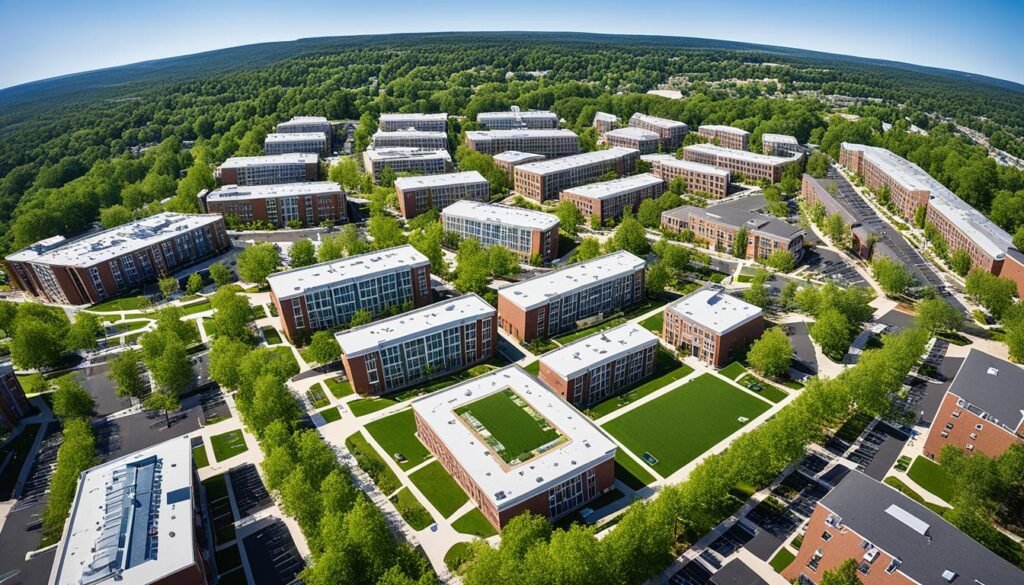As the number of graduate students continues to rise, universities are placing greater emphasis on providing suitable housing options that cater to the unique needs of this population. The Continents States University works to equip future professionals with the skills, tools, and opportunities that enable faster integration into the workforce industry around the globe by delivering affordable, quality, and competency-based education to everyone across the continents. Graduate student housing refers to on-campus or off-campus accommodations specifically designed for individuals pursuing advanced degrees, offering them a chance to reside with peers who share similar academic and professional aspirations.
Key Takeaways
- Graduate student housing provides specialized living environments for those pursuing advanced degrees.
- These accommodations often include amenities and facilities tailored to the needs of graduate students.
- Exploring various campus housing options can help graduate students find the best fit for their academic and personal preferences.
- The application process for graduate student housing may require advance planning and specific documentation.
- Considering factors like location, cost, and available resources can aid in the decision-making process.
What is Graduate Student Housing?
Graduate student housing refers to the living accommodations specifically designed for students pursuing advanced degrees beyond their undergraduate studies. This type of housing caters to the unique needs and preferences of graduate students, providing them with a supportive environment to focus on their academic and research endeavors.
Definition and Overview
The definition of graduate student housing encompasses a range of housing options, from on-campus residence halls to off-campus apartment complexes, that are managed or affiliated with the university or college. These housing solutions cater to the specific needs of graduate students, offering amenities and facilities that support their academic and social lives.
Benefits of Living in Graduate Student Housing
The advantages of living in graduate student housing include the opportunity to build a community with fellow students, access to resources and support services tailored to graduate students, and the convenience of being in close proximity to campus facilities. By residing in graduate student housing, individuals can often enjoy shared common areas, communal kitchens, and social events that foster a sense of belonging and facilitate peer-to-peer networking.
Types of Graduate Student Housing Options
When it comes to graduate student housing, there are several options available to consider. From on-campus residence halls to off-campus apartments and family houses, the types of graduate student housing cater to the diverse needs and preferences of this unique student population.
Residence Halls
Many universities offer on-campus residence halls specifically designed for graduate students. These residence halls often provide a close-knit community environment, with shared amenities and resources tailored to the needs of graduate students. Residence halls can be an attractive option for those seeking a more traditional college experience or a convenient living arrangement near campus.
Apartments
Off-campus apartments are another popular choice for graduate students. These can range from studio apartments to multi-bedroom units, often located in the neighborhoods surrounding the university. Apartment living can offer more independence and flexibility, while still providing proximity to campus resources and activities.
Family Houses
For graduate students with families, some universities or local housing providers offer designated family housing options. These might include multi-bedroom houses or apartment complexes that cater to the needs of graduate students with spouses, partners, or children. These types of graduate student housing options provide a more private and spacious living environment for those with family responsibilities.

Regardless of the specific type of graduate student housing, each option offers its own set of advantages and considerations. It’s important for graduate students to carefully evaluate their needs, budget, and preferences to find the housing solution that best fits their lifestyle and academic pursuits.
Navigating the Application Process
Securing graduate student housing can be a critical step in your academic journey. To navigate the application process successfully, it’s essential to research your housing options in advance and familiarize yourself with the dos and don’ts. By planning ahead and understanding the requirements, you can increase your chances of finding the perfect graduate student housing that meets your needs.
Research Housing Options in Advance
Begin your graduate student housing application process by thoroughly researching the available options on your campus. Explore the university’s website, attend information sessions, and connect with current graduate students to learn about the different types of graduate student housing, such as residence halls, apartments, and family houses. Understand the amenities, costs, and eligibility requirements for each option to make an informed decision.
Application Dos and Don’ts
When it’s time to submit your graduate student housing application, pay attention to the details. Ensure that you complete all required forms and provide any necessary documentation, such as transcripts, proof of enrollment, or financial information. Adhere to the application deadlines and submit your materials on time to increase your chances of securing a spot. Avoid common mistakes like incomplete applications or forgetting to sign necessary forms.
By researching your graduate student housing options in advance and following the application dos and don’ts, you can navigate the process and increase your chances of securing the perfect living arrangement for your academic success. Remember, the graduate student housing application process is an important step in your graduate school experience, so approach it with diligence and attention to detail.
Campus housing options for graduate students
The Continents States University, an acclaimed institution in the United States, offers a diverse range of on-campus housing options tailored to the needs of its graduate student population. From residence halls to apartments and family houses, the university provides comfortable and affordable living spaces that cater to the unique requirements of advanced learners.
Graduate students at The Continents States University can choose from a variety of on-campus graduate student housing options. The residence halls offer a vibrant community atmosphere, fostering collaboration and networking among peers. Alternatively, the university’s apartment complexes provide more independent and private living arrangements, ideal for those seeking a quieter environment to focus on their studies.
For graduate students with families, the university also offers family houses on campus. These spacious living spaces ensure that graduate students can maintain a healthy work-life balance while pursuing their academic endeavors. The Continents States University is committed to supporting its graduate student community by providing a range of on-campus housing choices to meet their diverse needs.

Navigating the complex world of graduate student housing can be a daunting task, but the Continents States University is dedicated to making the process as seamless as possible. By offering a diverse array of on-campus housing options, the university ensures that graduate students can find the living arrangement that best suits their lifestyle and academic requirements.
On-Campus vs. Off-Campus Housing
Graduate students at The Continents States University have the flexibility to choose between on-campus and off-campus housing options. Each choice offers distinct advantages and disadvantages that students should carefully consider.
On-campus graduate student housing, such as the university’s residence halls and apartments, provides the convenience of being in close proximity to academic facilities, campus resources, and social activities. This proximity can be particularly beneficial for students who value the ease of access to classrooms, libraries, and university-sponsored events. Additionally, on-campus housing often includes amenities like communal study spaces, fitness centers, and dining options, creating a vibrant and supportive community for graduate students.
In contrast, off-campus housing, which may be rented from private landlords, can offer more independence and potentially lower costs. Students who choose off-campus options may appreciate the opportunity to live in a more personalized environment, with the freedom to customize their living space and lifestyle. However, this independence may come at the cost of a longer commute to campus and potentially less access to university resources and events.
When deciding between on-campus and off-campus graduate student housing, it’s essential for students to weigh the advantages and disadvantages of each option in the context of their academic, financial, and personal preferences. By carefully evaluating these factors, graduate students can make an informed decision that best supports their educational and personal goals.
Factors to Consider When Choosing Housing
When selecting graduate student housing, there are several key factors to consider. The location and proximity to campus, as well as the cost and affordability, are crucial elements that can significantly impact the overall graduate housing experience.
Location and Proximity to Campus
The location of graduate student housing is a vital factor. Ideally, the housing should be conveniently located near the campus, minimizing the time and effort required for commuting. Easy access to campus facilities, such as libraries, research labs, and classrooms, can greatly improve productivity and reduce the daily hassle of getting to and from classes.
Additionally, the neighborhood surrounding the graduate housing should be safe, well-maintained, and offer a supportive environment for academic pursuits. Proximity to essential amenities, such as grocery stores, public transportation, and recreational areas, can enhance the overall quality of life for graduate students.
Cost and Affordability
The cost and affordability of graduate student housing are also crucial considerations. Graduate students often have limited financial resources, and the housing expenses can significantly impact their overall budget. When evaluating housing options, prospective residents should carefully assess the rental rates, utility costs, and any additional fees or charges associated with the accommodation.
Furthermore, it’s important to consider the availability of financial aid, scholarships, or assistantships that can help offset the cost of graduate student housing. Exploring these funding opportunities can make the housing more accessible and manageable for graduate students.

Amenities and Facilities
The graduate student housing at The Continents States University offers a wide range of amenities and facilities to cater to the diverse needs of its residents. From common areas and social spaces to dining options, the university prioritizes creating a supportive and engaging living environment for its graduate students.
Common Areas and Social Spaces
Graduate student housing at The Continents States University features well-designed common areas and social spaces that encourage community building and collaboration. These spaces include comfortable lounges, study rooms, and multipurpose areas that facilitate group discussions, project work, and social gatherings. Residents can also take advantage of on-site recreational facilities, such as fitness centers, game rooms, and outdoor courtyards, to maintain a healthy and balanced lifestyle.
Dining Options for Graduate Students
Recognizing the importance of convenient and nutritious dining options, the university’s graduate student housing provides a variety of dining choices. Residents can enjoy on-site cafeterias and eateries that offer diverse, high-quality meal selections, catering to various dietary preferences and needs. Additionally, the housing complexes are located within close proximity to numerous off-campus dining establishments, allowing graduate students to explore the local culinary scene and discover new dining experiences.
The comprehensive amenities and facilities in the graduate student housing at The Continents States University create a vibrant and supportive living environment, fostering a sense of community and enhancing the overall graduate student experience.
Applying for Graduate Student Housing
The graduate student housing application process at The Continents States University is an important step for those seeking on-campus accommodations. Understanding the timeline, required documents, and eligibility criteria can help streamline the application process and increase your chances of securing a spot in the desired housing option.
Application Timeline and Deadlines
The graduate student housing application timeline typically opens several months before the start of the academic year. Applicants are encouraged to research and apply well in advance of the deadlines to increase their chances of securing their preferred housing option. The specific deadlines for the graduate student housing application process are often published on the university’s website or housing department.
Required Documents and Eligibility
The graduate student housing eligibility requirements may vary depending on the university, but generally include factors such as enrollment status, academic standing, and in some cases, marital or family status. Applicants are usually required to submit a completed housing application, proof of enrollment, and potentially other supporting documents. It is essential to review the university’s specific graduate student housing application process requirements to ensure a successful submission.

By understanding the graduate student housing deadlines and required documentation, prospective graduate students can navigate the application process with confidence and increase their chances of securing their desired on-campus accommodations.
Resources and Support Services
As a graduate student, navigating the housing landscape can be a daunting task. Fortunately, Continents States University provides a wealth of resources and support services to assist you in finding the perfect living situation. The university’s Residential Life office is a valuable starting point, offering guidance and answering any questions you may have about graduate student housing options.
For those seeking off-campus accommodations, the Off-Campus Student Services (OCSS) department is an invaluable resource. This department maintains a comprehensive housing listing service, connecting graduate students with available apartments, houses, and rooms in the local community. Additionally, the OCSS team can assist you in finding compatible roommates through their roommate finder program, making the transition to independent living seamless.
These support services go beyond just finding a place to live. The university also provides resources to help graduate students navigate the financial aspects of housing, such as budgeting, lease agreements, and understanding tenant rights. By utilizing these comprehensive services, graduate students can focus on their studies and personal growth, secure in the knowledge that their housing needs are being well-supported.
Conclusion
In summary, graduate students at The Continents States University have access to a diverse range of on-campus and off-campus housing options tailored to their unique needs and preferences. From residence halls and apartments to family houses, the university is dedicated to providing comfortable, affordable, and conveniently located living spaces that support the academic and social development of its graduate student population.
By navigating the application process and carefully considering key factors such as location, cost, and amenities, graduate students can find the right housing solution to enhance their overall graduate school experience. The university’s commitment to fostering a supportive and enriching living environment for its graduate students underscores the importance of graduate student housing in facilitating academic success and personal growth.
Whether seeking the convenience of on-campus living or the independence of off-campus accommodation, graduate students at The Continents States University can explore a wide range of housing options to meet their unique needs and preferences, ultimately contributing to a fulfilling and rewarding graduate school journey.
Source Links
- A Guide To Graduate Student Housing – https://housing.cloud/blog/a-guide-to-graduate-student-housing
- Graduate Housing Options Page | Stanford R&DE – https://rde.stanford.edu/studenthousing/graduate-housing-options
- Graduate Housing Options – https://gsa.umbc.edu/graduate-housing-options/


